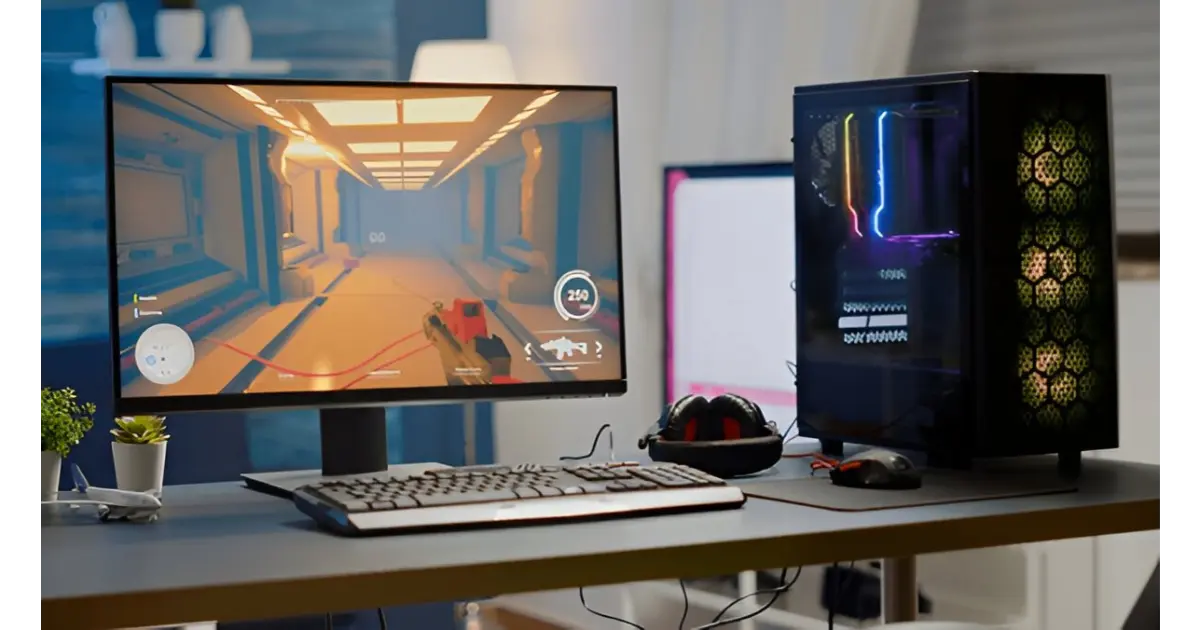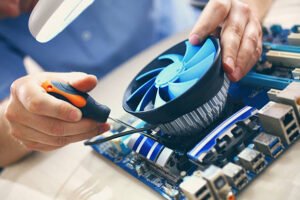If you are looking to build or upgrade a gaming PC, one of the most important things to check is its power consumption. Different PC’s have varying power needs, and the wattages depend on the components inside. An entry-level gaming PC usually uses between 300-375W, while a mid-range build might need around 450W or more. Higher-end systems, especially those with powerful GPUs, can require 500W or more to handle transient loads. The power supply unit you choose must provide enough maximum headroom to support your system efficiently.
Choosing the Right Power Supply for PC
A good guide for selecting a power supply is to consider at least 100W above your system’s average consumption to prevent power shortages. For mid-tier systems, a 450W or 500W PSU works well, while higher end builds may need a 200W overhead. Manufacturers offer power supplies with various rating levels, ensuring safety features and energy savings. If you want an efficient system, there are many ways to calculate its power needs. A helpful tool is an online calculator, where you can find the exact wattage your gaming PC requires.
Managing Power for Long-Term Performance
A custom gaming PC needs a well-balanced power supply to maintain efficient operation. The type of power supply unit you choose will affect energy consumption and system stability. Many gamers overlook this, but choosing the right PSU prevents overheating and extends component lifespan. If you want to get the most out of your build, it’s worth checking different sizes and kinds of power supplies. There is no single best option, but selecting the right PSU for your gaming PCs ensures better performance in the long run.
How Much Will Your Gaming PC Cost in Electricity?
The cost of running a gaming PC depends on its power rating and the components inside. A high-end CPU and a powerful graphics processing unit (GPU) will consume more electricity, leading to higher electricity costs. Most gaming PC’s have an average wattage between 300 – 500 watts, and if used for long hours, they can increase your energy bill by around $10 to $20 per month. Unlike a typical PC, a gaming rig has advanced hardware that requires more power to operate, producing a crisp, clear picture, but also making the gaming PC electricity cost higher.
Average Gaming PC Wattage Cost Per Month
Your electricity cost depends on your state and local electricity rate. In New York, for example, the rate is .23 cents per kWh. If you run a gaming PC that uses 300 watts for 5 hours daily, your monthly electricity bill will increase by $10.35. A 500-watt gaming computer running for 3 hours per day in Florida will add about $7.20 per month to your expenses. Understanding energy costs and smart budgeting can help manage these expenses efficiently.
What Increases My Gaming Computer Power Consumption?
A gaming PC usually consumes an average wattage of 300-500 watts, but this can increase depending on connected devices and system efficiency. Using outdated appliances leads to higher electricity use, making the PC work harder. If your system isn’t optimized, your electricity bill will rise due to excessive energy consumption.
Factors that Increase Gaming PC Power Consumption
Keeping outdated devices connected forces your system to use extra power. If your gaming PC lacks quality components or has too much dust, it may experience overheating, which can be damaging and cause it to work harder. Long time spent playing keeps the PC active, increasing energy use. Even in sleep mode, it still draws 2.6-5 watts, while a PC that isn’t fully shutdown may consume 1.5-1.9 watts. If you want to upgrade your PC, choosing a model with a minimum 450W power supply is important. Always check product reviews before making a purchase to ensure efficiency.
Components that Consume the Most Power
Certain components inside a gaming PC contribute the most to power consumption. The graphics card is the most power-hungry part, with high-end GPUs using up to 250 watts, especially when playing demanding games on high settings. The CPU (central processing unit) is another major power consumer, with high-performance CPUs drawing around 150 watts, especially when overclocked under a heavy load. The power supply unit (PSU) is responsible for delivering power, and its range varies from 300 to 1000 watts based on power demands. While RAM uses relatively less power, large amounts can still consume up to 50 watts. To manage and optimize energy usage, it’s important to monitor how much power each component draws.
How to Measure Power Consumption of PC
To get real-time data on power consumption, a power meter helps track the electricity used by a gaming PC. The power supply unit (PSU) has a wattage rating showing its maximum power output, which helps estimate an upper limit when the PC runs at full load. You can also use software tools like CPU-Z, GPU-Z, and HWiNFO to get detailed information on how individual components are consuming energy, offering useful insights into optimizing your system.
Measuring Power Usage
Understanding how much energy a gaming PC consumes is important for gamers who want to manage their electricity costs. This section will delve into the basics of measuring power usage, focusing on watts, kilowatt-hours, and the power supply ratings of a system.
Watts and Kilowatt-Hours
Watts (W) are the basic unit of power, showing the rate at which energy is used. When discussing gaming PCs, it’s common to see power consumption listed in watts. To get a clearer picture of usage over time, it’s helpful to convert watts into kilowatt-hours (kWh), which represent the total amount of energy used per hour. You can calculate it using this formula: (Power × Time) ÷ 1000. For example, if a PC uses 500 watts and operates for 3 hours, its consumption is 1.5 kWh.
Monitoring and Managing Power Usage
For gamers, knowing how to monitor and manage power usage is crucial to maintaining gaming PC performance while keeping electricity costs in check. High power use can lead to increased expenses, but with the right approach, you can optimise energy consumption without sacrificing gaming quality.
Software Tools for Monitoring
Several software tools are available to help track PC power usage by providing real-time data on each component that consumes power. This allows users to make informed decisions about system efficiency. HWMonitor is a useful tool that gives detailed information on voltage, temperature, and power consumption for various components like the CPU, GPU, and storage drives. Another option is Open Hardware Monitor, which offers similar insights and is open-source and customisable. NZXT CAM is also popular for its cooling solutions but is equally effective for monitoring power through its user-friendly interface and system metrics tracking.
Optimising Power Settings
Optimising power settings is an effective way to manage gaming PC power usage. Adjusting settings can enhance performance while reducing energy consumption. Windows offers power plans like Balanced, Power Saver, and High Performance—choosing the right one can greatly impact power usage. A balanced plan is often the best mix of efficiency and performance. GPU settings in the control panel allow you to manage power usage, with options like Power Saving Mode to reduce GPU power draw when maximum performance isn’t needed. In the BIOS or UEFI firmware, lowering CPU voltage and frequency can also help reduce power consumption without affecting gaming performance.
Frequently Asked Questions
How many watts does a gaming PC typically use?
A gaming PC usually consumes between 300-500 watts, but high-end setups with powerful GPUs and CPUs can use 600 watts or more. The actual power usage depends on your hardware, games played, and system settings.
Does playing demanding games increase power consumption?
Yes, playing demanding games at high settings makes the GPU and CPU work harder, increasing power consumption. Overclocking also raises energy usage, as components need more power to perform at higher speeds.
How can I measure my gaming PC’s power usage?
You can use a power meter to get real-time data on your PC’s electricity usage. Software tools like HWMonitor, GPU-Z, and HWiNFO also provide insights into how much power individual components consume.
Can I reduce my gaming PC’s power consumption?
Yes, enabling power-saving settings in Windows, GPU control panels, and BIOS can lower electricity usage. Using a balanced power plan, reducing background processes, and cleaning dust from components help improve energy efficiency.
Does my PC’s power supply affect energy consumption?
Yes, a power supply unit (PSU) with higher efficiency ratings (like 80 Plus Gold or Platinum) wastes less electricity as heat. A high-quality PSU ensures that your gaming PC runs efficiently without drawing excess power.








